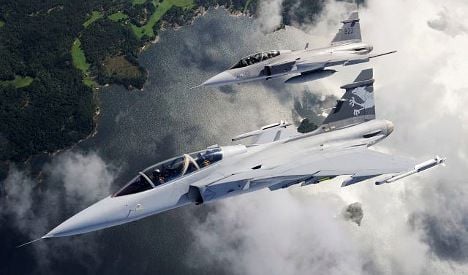“The Federal Council has decided to acquire 22 Saab Gripen fighter planes to replace the obsolete F5 Tiger,” a statement said.
The planes were selected over the French Dassault Rafale and the EADS Eurofighter, also being considered for the multi-billion franc contract.
The candidates had been subjected to a robust evaluation lasting several years, the government said, and by opting for the Gripen had chosen a jet which “fulfils military demands” while being financially sustainable.
The planned purchase will be put to parliament as part of the government’s 2012 arms programme.
During its last session the Swiss parliament charged the government with launching the acquisition process for new planes by the end of the year.
“This decision allows us to acquire a high performance plane without compromising other military branches or their essential equipment,” said the government.
During a press conference in Bern, Swiss Defence Minister Ueli Maurer described the model as “technically excellent” while estimating the cost of the deal at up to 3.1 billion francs — said to be the cheapest of the three options.
Saab shares rose in Stockholm after the announcement, gaining 9.6 percent to 119 kronor ($17.6 dollars).
The choice came as a relative surprise in Switzerland after media reported several days ago that the Swedish plane had not fully passed technical tests.
A Paris-based analyst specialising in the air defence industry said the Rafale option was considerably more expensive and had little chance of winning the contract.
Saab admitted it made “huge concessions over the price to ensure it got the contract”, the analyst said, while adding that the deal could still be put to a referendum if there was sufficient opposition.
Saab said on Wednesday it was “proud and delighted” over Switzerland’s decision.
“Given that Switzerland is known globally for applying (the) highest procurement standards and requesting state-of-the art technologies, Saab is both proud and delighted that Gripen has been chosen as the Swiss Air Force’s future multirole fighter aircraft,” Saab said in a statement.
The Swiss selection “confirms that Saab is a market-leader in the defence and security industry and that Gripen is a world-class fighter system that provides the best value for money”, Saab CEO and president Håkan Buskhe said.



 Please whitelist us to continue reading.
Please whitelist us to continue reading.
Member comments